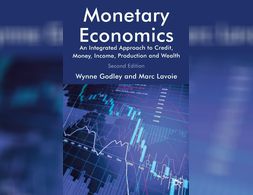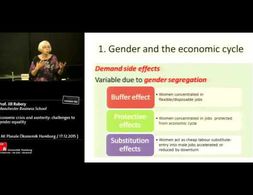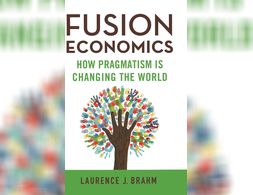✕
271 results
Recovery from the Covid-19 crisis provides a chance to implement economic measures that are also beneficial from environmental and social perspectives. While ‘green’ recovery packages are crucial to support economies tracking a low-carbon transition in the short-term, green measures such as carbon pricing are also key to improving welfare in the long-term. This commentary specifies the need for carbon pricing, outlines its implications for our everyday lives, and explains how it works alongside value-based change in the context of climate action and societal well-being.
Based on a paper by Jason Hickel and Giorgos Kallis Decoupling refers to the separation of economic value creation material extraction and pollution. Ecological limits pose a challenge to growth-led development and the low historical and predicted rate of decoupling suggests that long-term sustainable growth-led development is impossible.
The workshop deals with the contribution of Plural Economics to the urgently needed change of the economic system towards sustainability and global responsibility.
After completing the module, participants should be able to demarcate and explain different economic approaches to sustainability. They should be able to evaluate the respective concepts based on their contribution to the ecological transformation of the economic system.
In this book, the author critically examines a number of socialist proposals that have been put forward since the end of the Cold War. It is shown that although these proposals have many merits, their inability effectively to incorporate the benefits of information technology into their models has limited their ability to solve the problem of socialist construction. The final section of the book proposes an entirely new model of socialist development, based on a "needs profile" that makes it possible to convert the needs of large numbers of people into data that can be used as a guide for resource allocation. This analysis makes it possible to rethink and carefully specify the conditions necessary for the abolition of capital and consequently the requirements for socialist revolution and, ultimately, communist society.
Behavioural economics deals with observing behaviour and economic decision making behaviour.
This book challenges the mainstream paradigm, based on the inter-temporal optimisation of welfare by individual agents. It introduces a methodology for studying how institutions create flows of income, expenditure and production together with stocks of assets and liabilities, thereby determining how whole economies evolve through time.
Markets are the focus in modern economics: when they work, when they don’t and what we can or can’t do about it. There are many ways to study markets and how we do so will inevitably affect our conclusions about them, including policy recommendations which can influence governments and other major organisations. Pluralism can be a vital corrective to enacting real policies based on only one perspective and a plethora of approaches provide alternatives to the canonical view. Although they have differing implications, these approaches share the idea that we should take a historical approach, analysing markets on a case-by-case basis; and they share a faith in the power of both individuals and collectives to overcome the problems encountered when organising economic activity.
This course introduces students to the relevance of gender relations in economics as a discipline and in economic processes and outcomes. The course covers three main components of gender in economics and the economy: (1) the gendered nature of the construction and reproduction of economic theory and thought; (2) the relevance and role of gender in economic decision-making; and (3) differences in economic outcomes based on gender. We will touch on the relevance of gender and gender relations in at least each of the following topics: economic theory; the history of economic thought; human capital accumulation; labor market discrimination; macroeconomic policy, including gender budgeting; household economics; basic econometrics; economic history; and economic crises.
This is a recording of an introductory course held at the 4th International Degrowth Conference for Ecological Sustainability and Social Equity in Leipzig in 2014. Federico Demaria from the French-Spanish organisation Research and Degrowth gives an introduction to degrowth. The presentation is based on the introduction to the book “Degrowth. A vocabulary for a new era.” and discusses definitions of degrowth, degrowth literature, debates, history and further research to be done.
In this lecture Mirowski claims that a good critique of and alternative to neoclassical economics should focus on microeconomics. In addition, he claims that mainstream economics is not about a specific "human nature", instead the understanding of markets (partially based on Hayek) is of special importance. As an alternative Mirowski proposes institutionalist economics that builds upon how markets work nowadays (e.g. links to computer science).
Departing from an analysis of women's employment and changing gender regimes in the pre crisis period, Jill Rubery illustrates how the crisis affects men's and women's employment differently. Afterwards, she discusses the crisis' impact on gender relations. Based on empirical findings, she shows how men were more affected by the recession and women more by austerity and presents possible explanations. Those are furthermore linked to women's employment decisions and prevalent gender regimes. In particular, Rubery discusses cut backs in public spendings on care, flexibilization and the role of conservative gender ideologies.
In this radio program, the anthropologist David Graeber, explores the history of debt in (currently) 12 episodes. The program is based on his book Debt: The First 5000 Years. First, Graeber asks the questions of how debt and money are characterized, which meaning and roles they had in different historic episodes and how they were interrelated. In the most recent episodes, Graeber elaborates on how debt shaped society. He argues that debt had a different moral status in different times of history, one session analyses the current financial and economic crisis and the role of credit in this historical context.
This text provides an overview of feminist perspectives on various kinds of work and reproductive labour. The authors start at the intersection of Marxism and Feminism. They, then, give a historical background on the United States feminist movement. They, finally, provide alternative perspectives on work and reproductive labor that are not based on Marxist Feminist theory.
Based on Modern Money Theory (MMT), Stephanie Kelton compares the cryptocurrency to the fiat money system (or simply what we have today).
In her short contribution, the author questions how the value of goods and services is shaped in current neoclassical teaching. She criticizes the principle of pricing based on marginal income. She discusses what can be called wealth generating, what kind of wealth we need and points out a lack of a value theory.
The world is coping with a global disaster, as the new Coronavirus takes a toll on many lost lives and a severe impact on economic activity. To provide a long-run perspective, this column documents the international response to a variety of disasters since 1790. Based on a new comprehensive database on loans extended by governments and central banks, official (sovereign-to-sovereign) international lending is much larger than generally known. Official lending spikes in times of global turmoil, such as wars, financial crises or natural disasters. Indeed, in these periods, official capital flows have repeatedly surpassed total private capital flows in the past two centuries. Wars, in particular, were accompanied by large surges in the volume of official cross-border lending.
Jens Beckert and Richard Bronk, authors of "Uncertain Times", explore the extent to which flaws, blind spots and more importantly bias created by macroeconomics models, based on forecasts and statistical devices, shape crisis and the market economy in which we live.
This paper presents an overview of different models which explain financial crises, with the aim of understanding economic developments during and possibly after the Great Recession. In the first part approaches based on efficient markets and rational expectations hypotheses are analyzed, which however do not give any explanation for the occurrence of financial crises and thus cannot suggest any remedies for the present situation. A broad range of theoretical approaches analyzing financial crises from a medium term perspective is then discussed. Within this group we focused on the insights of Marx, Schumpeter, Wicksell, Hayek, Fisher, Keynes, Minsky, and Kindleberger. Subsequently the contributions of the Regulation School, the approach of Social Structures of Accumulation and Post-Keynesian approach, which focus on long-term developments and regime shifts in capitalist development, are presented. International approaches to finance and financial crises are integrated into the analyses. We address the issue of relevance of all these theories for the present crisis and draw some policy implications. The paper has the aim to find out to which extent the different approaches are able to explain the Great Recession, what visions they develop about future development of capitalism and to which extent these different approaches can be synthesized.
The article compares market fundamentalism and right-wing populism on the basis of its core patterns of thinking and reasoning. Based on an analysis of important texts in both fields we find many similarities of these two concepts in their "inner images". Thus, we develop a scheme of the similar dual social worlds of right-wing-populism and market fundamentalism and offer some recent examples of market fundamentalism and right-wing populism mutually reinforcing each other or serving as a gateway for each other. We then apply our scheme for the analysis of the recent political developments and its ideological roots in the US under Donald Trump.
This short video visualizes the destabilizing effects financial markets can have on food prices, based on a paper by Jayati Ghosh. It introduces and explains the idea of future contracts and how those are used to speculate with basic food stuffs. After establishing the concepts, the video sketches out how the increase in those practices resulted in a substantial rise and later collapse of food prices around 2008 with severe consequences for many developing countries and their people.
Beyond Growth is a collection of educational materials offering a reflection on growth. It was created as a joint project of the associations Fairbindung e. V. and Konzeptwerk Neue Ökonomie, both based in Germany. The page provides learning materials and methods to stimulate thinking about the conditions of our current economy as well as possible alternatives.
This lecture is based on the “Introducing the Economy” chapter from the Economy Studies book, which introduces the first building block in their framework for transforming the economics education. The aim is to give students a feel and
understanding of the economy as part of a bigger whole. Thus, it is aimed to introduce to students before getting into the economics curriculum with theory and models.
The current international financial system has created a huge gap between the wealthy and the rest. Grounded and straightforward in his approach, Brahm calls for a turn away from economic systems dangerously steeped in ideology and stymied by politics, outlining a new global consensus based on pragmatism, common sense, and grass-roots realities.
This volume explores the relationship between law and economics principles and the promotion of social justice. By social justice, we mean a vision of society that embraces more than traditional economic efficiency. Such a vision might include, for example, a reduction of subordination and discrimination based on race, religion, gender, sexual orientation, age, disability or class.
Modern Monetary Theory and Practice: An Introductory Text is an introductory textbook for university-level macroeconomics students. It is based on the principles of Modern Monetary Theory (MMT).
In the graveyard of economic ideology, dead ideas still stalk the land.
The recent financial crisis laid bare many of the assumptions behind market liberalism—the theory that market-based solutions are always best, regardless of the problem. For decades, their advocates dominated mainstream economics, and their influence created a system where an unthinking faith in markets led many to view speculative investments as fundamentally safe.
Smith contends that there is no possible solution to our global ecological crisis within the framework of any conceivable capitalism. The only alternative to market-driven planetary collapse is to transition to a largely planned, mostly publicly-owned economy based on production for need, on democratic governance and rough socio-economic equality, and on contraction and convergence between the global North and South.
Macroeconomics is fundamental to our understanding of how the world functions today. But too often our understanding is based on orthodox, dogmatic analysis.
The investigative research conducted by the German weekly newspaper "Die Zeit" and the British Daily Newspaper "The Guardian" includes a research-based critique of carbon trading.
The book is a collection of 51 texts by different scholars and activists, who each adds a dimension/perspective to the topics of degrowth and societal transformation. A societal transformation towards a degrowth society is dependent on a lot of ideas coming together and creating change from various starting points within a society. Therefore, the authors are quite diverse and their contributions vary from being philosophical, natural science based, economic, sociological and so forth. Some are specfiically focused on a concept and others are a more broad critique of e.g., capitalism or growth.
Lean Logic is the late David Fleming’s masterpiece, the product of more than thirty years’ work and a testament to the creative brilliance of one of Britain’s most important intellectuals. A dictionary unlike any other, it leads readers through Fleming’s stimulating exploration of fields as diverse as culture, history, science, art, logic, ethics, myth, economics, and anthropology, being made up of four hundred and four engaging essay-entries covering topics such as Boredom, Community, Debt, Growth, Harmless Lunatics, Land, Lean Thinking, Nanotechnology, Play, Religion, Spirit, Trust, and Utopia. The threads running through every entry are Fleming’s deft and original analysis of how our present market-based economy is destroying the very foundations—ecological, economic, and cultural— on which it depends, and his core focus: a compelling, grounded vision for a cohesive society that might weather the consequences
The article pursues the two related questions of how economists pretend to know and why they want to know at all. It is argued that both the economic form of knowledge and the motivation of knowing have undergone a fundamental change during the course of the 20th century. The knowledge of important contemporary economic textbooks has little in common with an objective, decidedly scientifically motivated knowledge. Rather, their contents and forms follow a productive end, aiming at the subjectivity of their readers.
We use cookies on our website. Click on Accept to help us to make Exploring Economics constantly better!































